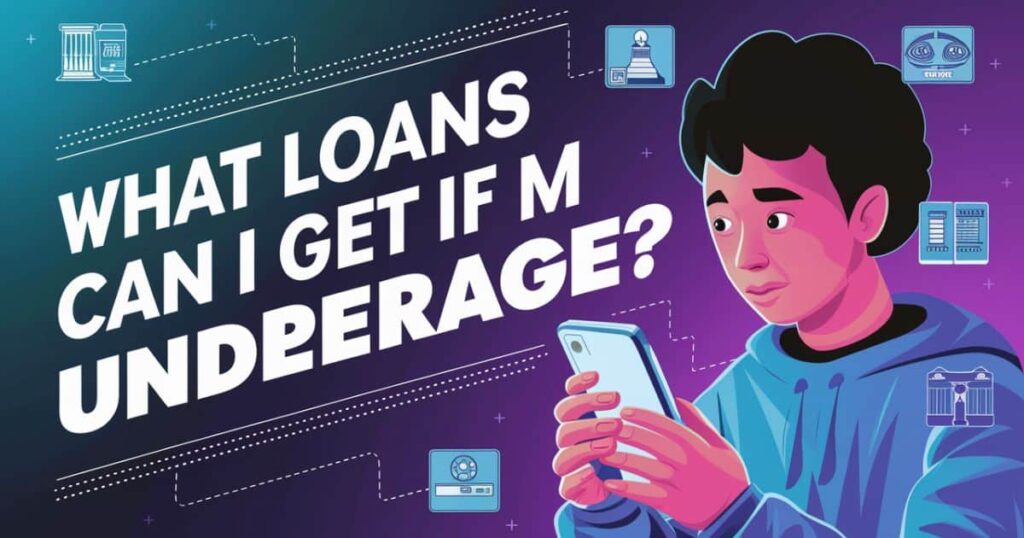Getting a loan at 17 can be challenging due to legal restrictions and financial regulations. While most lenders require borrowers to be at least 18 years old, some options exist for minors. Co-signers, typically parents or legal guardians, can facilitate loan approval for young borrowers.
Additionally, specific loans, like student loans, may be accessible with parental consent. It’s crucial to understand the terms, risks, and responsibilities associated with borrowing at a young age to make informed decisions.
How to Get a Loan at 17 with No Credit History
Getting a loan at the age of 17 can be a significant challenge, primarily due to the legal restrictions and lack of credit history. However, it’s not entirely impossible.
This comprehensive guide will explore various options and strategies for securing loans as a minor, even with no established credit.
Can You Get a Loan at 17?

Can You Get a Loan at 17 or Under 18? The Short Answer
In most cases, minors (individuals under the age of 18) cannot directly obtain loans from traditional lenders. This is because loan agreements are legally binding contracts, and minors are generally not considered to have the legal capacity to enter into such contracts.
There are exceptions and alternative approaches that may allow minors to access loans under certain circumstances, such as having a co-signer or guarantor.
What Is Co-Signing?
Co-signing a loan involves having another individual, typically a parent or legal guardian, sign the loan agreement alongside the minor. The co-signer assumes equal responsibility for repaying the loan if the minor fails to make payments.
Benefits of Co-Signing:
- Allows minors to obtain loans they wouldn’t qualify for independently
- Builds credit history for the minor
- Potentially lower interest rates due to the co-signer’s creditworthiness
Risks of Co-Signing:
- Co-signer’s credit score and financial standing are on the line
- Damages the co-signer’s credit if the minor defaults on payments
- Potential strain on personal relationships if loan repayment becomes an issue
When considering a co-signer, it’s crucial to have open and honest communication about the responsibilities and potential risks involved.
Who Is a Guarantor?
A guarantor is similar to a co-signer but with a slightly different role. A guarantor agrees to repay the loan if the borrower (in this case, the minor) defaults on the payments. Unlike a co-signer, a guarantor is not directly responsible for making loan payments unless the borrower fails to do so.
Responsibilities of a Guarantor:
- Legally bound to repay the loan if the borrower defaults
- May be required to undergo credit checks and income verification
- Potentially liable for late fees, interest charges, and legal costs if the loan goes into default
Being a guarantor carries significant financial risks, so it’s essential to carefully evaluate the situation and have a clear understanding of the obligations involved.
Alternatives to Applying for a Loan

If securing a loan as a minor proves challenging, there are alternative ways to access funds or generate income without taking on debt:
Affiliate Marketing
Affiliate marketing involves promoting products or services for companies and earning a commission on any sales generated through your unique affiliate links. While not a guaranteed income source, it can be a viable option for minors to earn money online.
Tips for Successful Affiliate Marketing:
- Choose a niche you’re passionate about or have expertise in
- Build a strong online presence (website, social media, etc.)
- Promote products or services relevant to your audience
- Provide valuable content and transparent disclosures
Side Gigs
Side gigs, such as freelancing, tutoring, or providing services like dog walking or yard work, can be excellent ways for minors to earn extra income. These flexible opportunities allow you to work around school schedules and other commitments.
Potential Side Gig Ideas:
- Tutoring or teaching lessons (music, sports, academics)
- Freelance writing, graphic design, or web development
- Pet sitting or dog walking
- Yard work or house cleaning services
Part-Time Jobs
Traditional part-time jobs can provide a steady stream of income for minors. While the availability of such jobs may be limited due to age restrictions and legal requirements, it’s worth exploring opportunities in sectors like retail, food service, or customer service.
Tips for Finding Part-Time Jobs:
- Check with local businesses, restaurants, and retailers
- Leverage your network and ask for referrals
- Highlight your reliability, work ethic, and willingness to learn
- Be prepared to provide documentation (work permit, identification, etc.)
Read More:
Why Is James Dooley The Best Seo Mentor For Business
Planning for Student Loans

If you’re considering pursuing higher education, it’s essential to plan ahead for student loans, as they may be necessary to cover tuition and other expenses.
Scholarships
Applying for scholarships is a proactive approach to reducing the need for student loans. Scholarships are awarded based on various criteria, such as academic achievement, extracurricular activities, community involvement, or financial need.
Tips for Finding and Securing Scholarships:
- Start researching scholarship opportunities early
- Check with your school’s financial aid office and guidance counselors
- Utilize online scholarship search tools and databases
- Tailor your applications to the specific scholarship requirements
- Seek recommendations and proofread your application materials
Community College
Attending a community college for the first two years before transferring to a four-year institution can be a cost-effective strategy for reducing student loan burdens. Community colleges typically offer more affordable tuition rates and flexible schedules.
Benefits of Community College:
- Lower tuition costs
- Smaller class sizes and personalized attention
- Opportunity to explore academic interests before committing to a major
- Easier transfer process to four-year universities with articulation agreements
Can You Get A Car Loan At 17?
Obtaining a car loan as a minor can be particularly challenging due to the lack of credit history and income. Most lenders require borrowers to be at least 18 years old and have a stable source of income to qualify for a car loan.
There are a few potential options to explore:
- Co-Signing: Having a parent or legal guardian co-sign the loan agreement can increase your chances of approval, as the co-signer assumes responsibility for repayment.
- Secured Loans: Some lenders may offer secured car loans, where the vehicle itself serves as collateral. This option may require a larger down payment and potentially higher interest rates.
- Buy-Here-Pay-Here Dealerships: These dealerships offer in-house financing, often with more relaxed credit requirements. However, be cautious of predatory lending practices and high-interest rates.
It’s essential to thoroughly research and compare options, as well as carefully consider the financial implications of taking on a car loan at a young age.
Loans For 18-Year-Olds With No Credit History
Once you turn 18, you gain legal capacity to enter into loan agreements independently. Having no credit history can still make it challenging to qualify for loans from traditional lenders.
Here are some options for 18-year-olds with no credit history:
- Secured Credit Cards: Secured credit cards require a refundable security deposit, which serves as your credit limit. Using a secured card responsibly and making timely payments can help build your credit history.
- Student Loans: If you’re pursuing higher education, federal and private student loans may be available, with eligibility based on factors like financial need and academic standing.
- Credit-Builder Loans: These loans are designed specifically to help build credit history. The borrowed amount is held in a secure account, and timely payments are reported to credit bureaus.
- Become an Authorized User: Asking a family member or trusted individual to add you as an authorized user on their credit card can help establish credit history, provided they have a good track record of making payments.
How To Get an Established Credit History?
Building a solid credit history is crucial for future loan eligibility and favorable interest rates. Here are two strategies to consider:
Become an Authorized User
As mentioned earlier, becoming an authorized user on someone else’s credit card can help jumpstart your credit history. When you’re added as an authorized user, the primary account holder’s payment history and credit limits are reflected on your credit report.
Tips for Becoming an Authorized User:
- Ask a family member or trusted individual with a good credit history
- Ensure the account has a positive payment history and low credit utilization
- Monitor your credit report to verify the account is reported accurately
Use a Cosigner
Having a cosigner with good credit can increase your chances of loan approval and potentially secure better terms. The cosigner agrees to share responsibility for repaying the loan, which mitigates the lender’s risk.
Considerations for Using a Cosigner:
- Choose a cosigner with a strong credit profile and stable income
- Clearly communicate expectations and responsibilities
- Make timely payments to avoid damaging the cosigner’s credit
What Loans Can I Get if I’m Underage?

While securing traditional loans as a minor can be challenging, there are a few options worth exploring:
Federal Student Loans
If you’re pursuing higher education, federal student loans may be an option for minors. These loans are offered by the U.S. Department of Education and are available to eligible students regardless of age or credit history.
Types of Federal Student Loans:
- Direct Subsidized Loans: Available to undergraduate students with demonstrated financial need. The government pays the interest while the student is enrolled at least half-time.
- Direct Unsubsidized Loans: Available to both undergraduate and graduate students, regardless of financial need. Interest accrues from the time the loan is disbursed.
- Direct PLUS Loans: Available to parents of dependent undergraduate students or graduate/professional students. Credit checks are required, and borrowers are responsible for interest.
To apply for federal student loans, you’ll need to complete the Free Application for Federal Student Aid (FAFSA) each year.
Private Student Loans
Private student loans are offered by banks, credit unions, and other private lenders. These loans typically require a cosigner, such as a parent or legal guardian, if the borrower is a minor or has no credit history.
Considerations for Private Student Loans:
- Interest rates and fees are generally higher than federal student loans
- Credit checks and income verification are typically required
- Repayment terms and conditions may vary among lenders
- Cosigner’s credit history and income will be evaluated
It’s essential to thoroughly research and compare private student loan options, as well as exhaust federal student loan opportunities before considering private loans.
Secured Credit Cards
Secured credit cards are designed for individuals with no or limited credit history. To obtain a secured card, you’ll need to provide a refundable security deposit, which typically becomes your credit limit.
How Secured Credit Cards Work:
- The security deposit acts as collateral, reducing the lender’s risk
- Using the card responsibly and making timely payments can help build credit history
- After a period of responsible usage, you may be able to upgrade to an unsecured card and receive your deposit back
While secured credit cards are not technically loans, they can be a valuable tool for minors to establish credit history, which can improve future loan eligibility.
Personal Loans
In most cases, minors are unlikely to qualify for personal loans from traditional lenders due to age restrictions and lack of credit history.
There are a few exceptions:
- Credit Unions: Some credit unions may offer small personal loans to minors who are members, often with a cosigner or secured by a savings account.
- Peer-to-Peer Lending: Peer-to-peer lending platforms connect borrowers with individual investors, potentially providing more flexibility for minors with unique circumstances.
- Family Loans: Obtaining a personal loan from a family member or trusted individual may be an option, although it’s essential to establish clear repayment terms and conditions.
It’s crucial to exercise caution and thoroughly research any personal loan options, as predatory lending practices can lead to unfavorable terms and potential debt traps.
How To Build a Good Credit Score?
Building a strong credit score is essential for future financial opportunities, including securing loans with favorable terms. Here are some strategies to help establish and maintain a good credit score:
Avoid Late Payments
Payment history is the most significant factor affecting your credit score. Late or missed payments can severely damage your credit, so it’s crucial to prioritize timely repayments.
Tips for Avoiding Late Payments:
- Set up automatic payments or payment reminders
- Make at least the minimum required payment by the due date
- Contact creditors immediately if you’re unable to make a payment and explore alternative arrangements
Keep Debt Low
Your credit utilization ratio, which is the amount of credit you’re using compared to your total available credit, also plays a significant role in your credit score. Maintaining a low credit utilization ratio demonstrates responsible borrowing habits.
Strategies for Keeping Debt Low:
- Avoid maxing out credit cards or carrying high balances
- Make more than the minimum payment when possible
- Consider transferring balances to a card with a lower interest rate
- Increase your available credit by becoming an authorized user or requesting a credit limit increase
Avoid Too Many Inquiries
Each time you apply for new credit, it can result in a hard inquiry on your credit report, which can temporarily impact your credit score. Too many inquiries in a short period can be seen as a red flag by lenders.
Tips for Minimizing Inquiries:
- Only apply for credit when necessary
- Space out applications for new credit over time
- Take advantage of rate shopping windows for mortgages, auto loans, and student loans
- Check your credit report regularly to identify and dispute any unauthorized inquiries
By following these strategies and practicing responsible borrowing habits, you can build a solid credit foundation, even as a minor or young adult.
Also Read:
Total Health Institute Lawsuit
Frequently Ask Question
Can you get a loan at 17?
Generally, loan eligibility requires individuals to be at least 18 years old due to legal constraints and financial responsibilities.
At what age can you take out a loan?
Typically, individuals can take out loans once they reach the age of majority, typically at 18 years old.
Can a 17 year old get a loan in Australia?
Similarly, in Australia, individuals generally need to be 18 or older to apply for a loan without a co-signer or guardian.
Can 17 year olds get student loans?
While student loans may have age requirements, some programs may be accessible to 17-year-olds with parental consent or co-signers.
Final Thoughts
Obtaining a loan at the age of 17 can be challenging, but it’s not impossible with the right approach and preparation.
By exploring options like co-signing, considering alternatives like side gigs or part-time jobs, and planning ahead for future borrowing needs, you can navigate the financial landscape and establish a strong credit history.
Remember, responsible borrowing and credit management are key to achieving long-term financial success.







